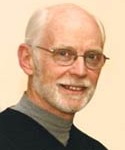I just heard from a History of Computing List of the distressing news of Mike Mahoney’s death. I did not know him well, so did not know his family beyond brief acquaintance; but I hope you can pass to them my sincere condolences. He was a warm and generous man who taught me a very great deal when I was young and eager at Princeton in 1970-72. I have a vivid image of him dressed up as Copernicus, delivering a lecture to the undergraduates – a nicely turned piece of theatre that worked perfectly and which he performed with grace and humour. I was surprised – and from then on had a much clearer sense of his considerable range of skills and personal gifts. After all, he didn’t appear to be a showy man – I had valued him for his understatedness, if anything – but he revealed he was an unshowy man who put on a very good show!
One of the longest lasting impressions was of his wit and humorous view of life and scholarship – a permanent undercurrent of the comic, often ready to emerge, ranging from the arch to the absurd. In later years, I would often turn to his work on the history of computing as the best guide to a field I was no expert in, quite the contrary, but found really interesting. It gave me a curious but considerable pleasure to realize he had helped open up this important new field, an enterprising and adventurous thing to do, and that he was helping lead that field by example. That example – finally, that was an important thing about Mike: his scholarship was impeccable and had strands of brilliance running through it. And that went hand in hand with my sense of the man: rigorous, honest, reliable – and sometimes very, very funny. Without thinking much about it, I realized how much I admired him. A very sad loss.
Very best wishes,
John
